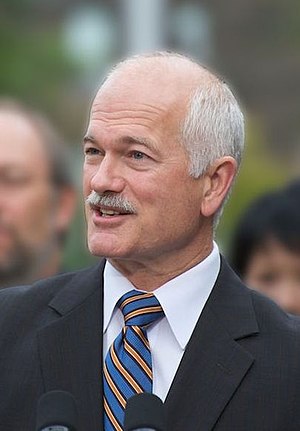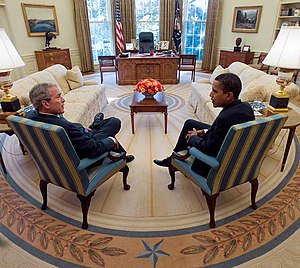 Image via Wikipedia
Image via WikipediaThe outpouring of public affection for Jack Layton took me by surprise, as it must have taken many other people, and it also set me seriously to think about those Canadian values that are so often spoken about, and so seldom defined.
This remarkable event cannot be seen in isolation: after all, when the CBC gave Canadians a chance some years ago to vote on who they considered the greatest Canadian of all time, their choice was Tommy Douglas, who as premier of Saskatchewan marched Canada into the modern world by creating what eventually became the national health scheme for the entire country.
This program had to be fought for bitterly, as it has in every country it has been introduced, but it is now so thoroughly accepted by Canadians that it is often regarded as the single thing that Canadians believe makes them different from Americans.
Now comes this extraordinary outpouring of affection and respect for the man who has led the NDP to its greatest electoral success ever, making a massive breakthrouth in Quebec, a territory that had previously been immune to the siren call of social democracy, having always preferred to vote for their nationalism, or ethnicity.
Of course, much of the affection came from Layton’s long and fruitful service as a municipal councilor in Toronto, whose citizens remember him as a decent man and an honest man, but also as a man whose optimism and humanity marked him off from the common herd of politicians.
A great deal of the admiration for Jack must have come from the last election, when he was seen --- a sick man --- bravely stumping the country, cane in hand, keeping up a pitiless schedule in his successful effort to lead his party to its huge breakthrough.
Still, the scale and intensity of the outpouring of public regard was a surprising thing. After all, until his recent breakthrough, the NDP had always been very much the third party in Canada, important for its policy initiatives, essential for its success in keeping the social democratic idea as part of the Canadian political discourse, and therefore a major element in the differentiation of Canada from the United States.
But can anybody have seriously believed such support exists for the values espoused by the New Democrats throughout the country: values of community, sharing, the idea that we are our brother’s keeper, essentially the value of equality and egalitarianism, the idea that everybody in the nation has a right to a fair chance, to develop his or her talents to the maximum. This is a way of saying social democracy that seems to suit Canadians, and yet, time after time, year after year, Canadians have voted against these values that they now seemed --- at least for a week or so --- to be so vociferously espousing.
Personally I have only twice joined a political party: the first time was when I arrived in England in 1951 in time for Labour to blow the immense majority they won in 1945 to let the reactionary Churchill back into office; the second time was when Layton was going for NDP leadership, and I joined to give his effort some support.
I have to confess that in neither case was my membership long-lasting. Although I have always supported the NDP in Canada, I have extravagant hopes of left-leaning parties that are never satisfied, and when I saw that Layton was not really a radical leader, I allowed my membership to lapse.
I never met Layton, not really, although on the one occasion I was introduced to him as he worked a room, he delivered a kind acknowledgement that he knew my work. I never heard from him again.
Anyway, politics isn’t about the stroking of egos, and I have always said --- I said this in relation to the fact that it took me 26 years to apply for Canadian citizenship --- that I believed I voted every day through the medium of my work.
The memorial service, as I would prefer to call the state funeral service held in his honour, was a very moving occasion that allowed a wide range of expressions of admiration for the man and his unquenchable optimism and friendliness --- which, I have got to admit, is something that separates him from me, a perennial grouch and pessimist. I could have done with less of the religious gentleman, whoever he was, a friend of Jack’s, who did manage, in the last moments, to invoke God and his blessings on everyone, something that I wuld have thought was against Jack’s inclinations.
Perhaps as a total event, it was a little over-the-top. How could it help but be when graced by one of Stephen Lewis’s over-heated tributes. Perhaps the most amazing thing about the event was that it had been ordered by the Prime Minister. And the most remarkable thing at it was when the entire crowd rose with a burst of wild applause when Lewis described Jack’s last letter as “a manifesto for social democracy.” That caught Harper and his Conservative Cabinet ministers on the hop, not sure whether to rise with the applauding crowd, or to mark their disapproval by just sitting there. Eventually Harper, bowing to the inevitable, rose to his feet and began to applaud, surely some kind of apotheosis for him.
Well, Jack is gone, and the choice os his successor lies ahead. Personally I would like someone like Libby Davies, a sound radical politician, but I know they will never support her, and it is almost certain that she would not succeed in building on Jack’s achievement, if only because she doesn’t speak French.
Some may have begun to wonder whether Lewis’s ringing elegy might not herald an effort by him to take over the party: he certainly would be a good choice, but I doubt if he would succeed in earning the trust of Canadians any more than he did last time when he led the Ontario NDP in the provincial legislature.
Besides, having been involved so internationally, one doubts if his ego would permit him to retire to the national stage again.
I have no idea who should be the leader: clearly, he has a tough act to follow, and whoever he or she is, it seems unlikely to be anyone with Jack’s common touch. We now have to just wait and see to what extent the outpoiuring for Jack has touched the hearts of Canadians, if at all.





